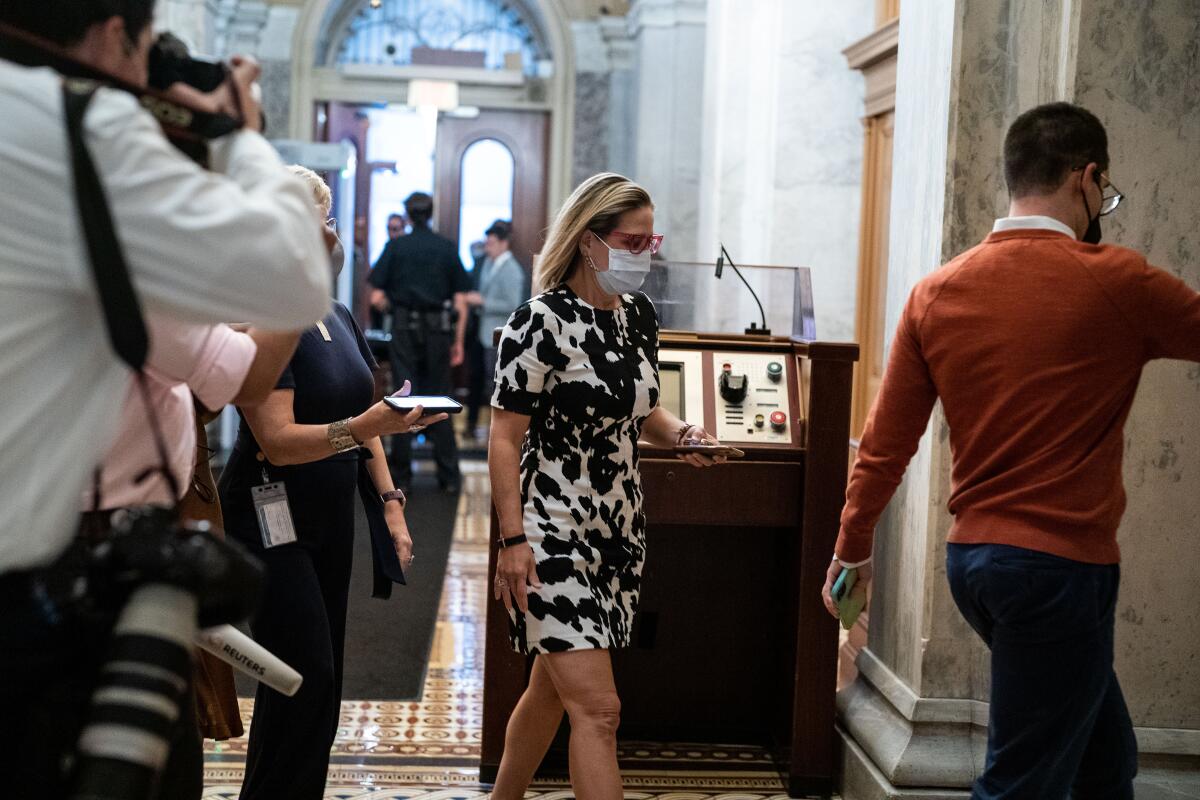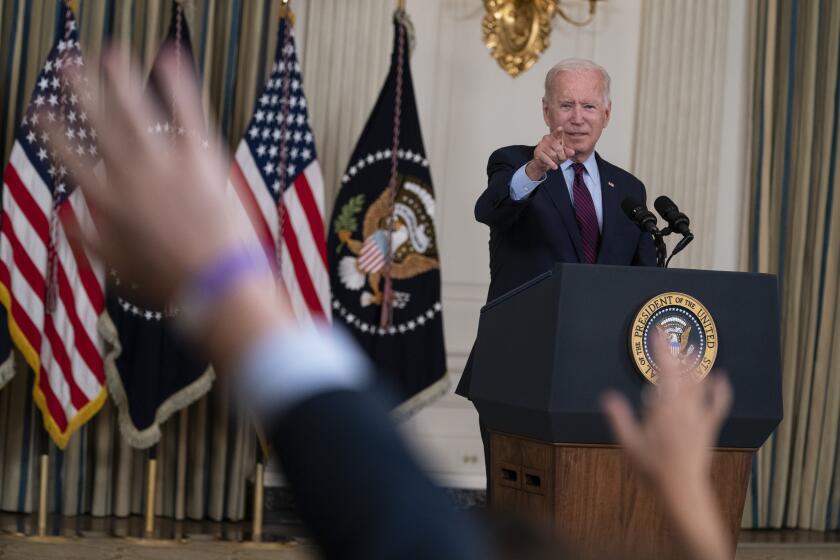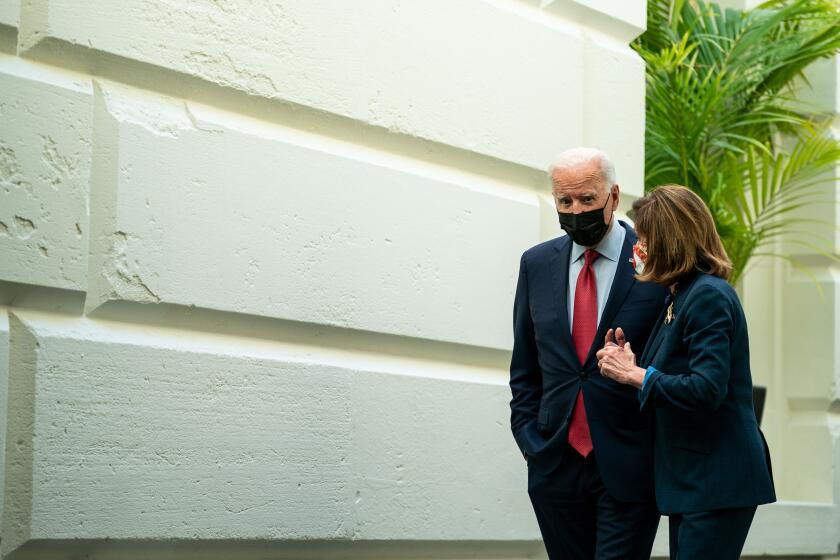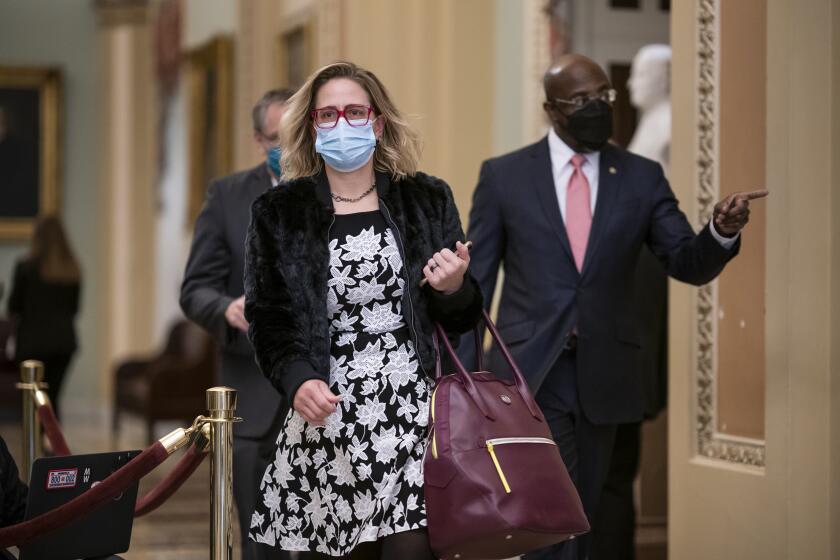Column: Sen. Kyrsten Sinema makes liberal heads explode. And that’s just fine with the Arizona Democrat

TEMPE, Ariz. — When Kyrsten Sinema ran for Senate in 2018, she could not have been more clear. The Democrat did not call herself a Democrat but rather an “Arizona independent.”
She refused to endorse her party’s liberal candidate for governor, who was shellacked the day Sinema narrowly won.
Her advertising suggested a strong aversion to partisanship. A lot of people in Washington “are more interested in their talking points and their ideology than getting stuff done,” she said in one roll-up-her-sleeves ad.
“Arizonans deserve a senator who just solves problems,” she said in another TV spot, swatting at both parties. “Not in a Republican way or Democratic way.... It will only work if we can work across the aisle.”
Funny thing: It seems as though Sinema actually meant it.
President Biden chides Republicans for refusing to raise the debt ceiling and warns of serious consequences if Congress fails to do so.
Along with Democratic Sen. Joe Manchin III of West Virginia, the freshman lawmaker has formed a human barricade blocking congressional passage of President Biden’s $3.5-trillion social welfare and climate change legislation.
Liberals insist that bill must pass before they approve a more conventional $1-trillion bricks-and-mortar infrastructure bill, which enjoys bipartisan support. (Progressives would gladly build a brick wall around Manchin and Sinema if they could.) And there matters rest, as they have for weeks.
Anyone surprised by Sinema’s stance hasn’t paid attention.
“I am confused by people’s confusion,” said Stacy Pearson, a Democratic strategist who helped Sinema win her first House race in 2012 in a highly competitive district here in the Phoenix suburbs.
“This is exactly what she told Arizona she would do,” said Stan Barnes, a former Republican state lawmaker who has known Sinema since she served in the Legislature before going to Congress. “A cynic would say you do what you do to get elected” and then change once in office.
Apparently, Barnes said, “she didn’t get the memo.”
Sinema’s political heresy extends beyond her objections to the size and scope of Biden’s massive and massively ambitious “human infrastructure” bill. She voted against including a $15 minimum wage in the coronavirus relief package, turning thumbs down with a curtsy that seemed to rub it in, and also opposes Democratic efforts to end the Senate filibuster.
The result is something rare, if not wholly unique in today’s unremittingly partisan political environment. Sinema outrages many of her fellow Democrats — already there are efforts underway to line up a 2024 primary challenger — and has forged an unusual fan base among Republicans.
Indeed, polling in Arizona shows Sinema more popular with segments of the GOP, notably suburban women, than she is with some Democrats.
“It’s driven by what she’s not, which is a highly partisan progressive,” said Chuck Coughlin, a veteran GOP strategist who became a political independent after Donald Trump became president. “That doesn’t get elected in Arizona.”
President Biden and many Democratic lawmakers wanted the biggest social investment in history. Here’s a look at what compromise could mean.
It is all very reminiscent of another senator who willfully broke with his party and derided those political purists who tried to hold him to account. Confounding members on both sides of the aisle, John McCain delighted in defying expectations and turned “maverick” into a popular political brand.
When Arizona Republicans marched against him in protest, the late senator breezily urged them to not forget their sunblock. Now it’s Sinema who’s drawing a rolling series of Democratic demonstrations outside her state offices.
She calls McCain a “personal hero” and even emulates his finely honed, if not always appreciated, sarcasm.
Democrats complain that Sinema has failed to publicly detail what she needs to support Biden’s signature legislation, beyond saying $3.5 trillion is too much and resisting tax hikes on corporations and the well-to-do to offset the increased spending.
“What do you say to progressives who are frustrated they don’t know where you are?” Sinema was asked in a recent impromptu exchange on Capitol Hill.
“I’m in the Senate,” Sinema responded.
“There are progressives in the Senate that are also frustrated they don’t know where you are,” NBC’s Frank Thorp followed up.
“I’m clearly right in front of the elevator,” she replied.
Sen. Kyrsten Sinema has evolved from far-left activist to a centrist Democrat. That got her elected in Arizona, but she now faces pushback from progressives.
It can be maddening. Her shameless fundraising while negotiations are underway puts off a bad odor. At times the image-conscious Sinema seems to be enjoying the bright lights a bit much.
Politically, however, her positioning makes sense.
There is a misapprehension that Arizona has suddenly become a blue state after Sinema won, Democrat Mark Kelly was elected to the Senate in 2020 and Biden beat Trump to capture the state’s 11 electoral votes.
It is not.
The governor is a Republican, as are most state lawmakers. Voter registration is split roughly one-third each among Democrats, Republicans and independents. Until Sinema came along, no Democrat had been elected to the Senate in three decades.
Trump made that victory possible along with Biden’s win by alienating huge numbers of GOP voters who defected to the Democrats. Even then, both races were close.
For all the talk of what Sinema owes Biden as a member of his party, it could be said the president is in Sinema’s debt for his slender Arizona victory. She showed wary Republicans that there really was such a thing as a not-scary, pragmatically moderate Democrat.
“Arizona is naturally a center-right state,” said Barnes, Sinema’s Republican admirer. “She knows her electorate, she knows her voters and she’s reflecting that in every move she makes.”
Sinema began her political career as a left-leaning Green Party activist, which raises an obvious question: Does she genuinely believe, in her heart of hearts, in the centrist positions she’s staked and the contrarian buck-the-party reputation she’s building as her political hallmark?
Only she knows for sure, and Sinema’s not talking.
More to Read
Get the L.A. Times Politics newsletter
Deeply reported insights into legislation, politics and policy from Sacramento, Washington and beyond. In your inbox three times per week.
You may occasionally receive promotional content from the Los Angeles Times.














